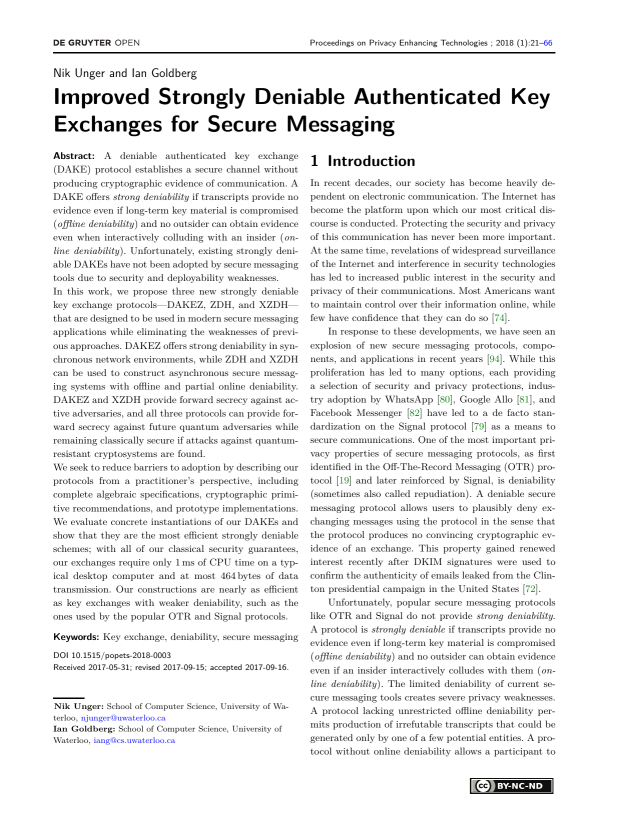Improved Strongly Deniable Authenticated Key Exchanges for Secure Messaging
Authors: Nik Unger (School of Computer Science, University of Waterloo), Ian Goldberg (School of Computer Science, University of Waterloo)
Volume: 2018
Issue: 1
Pages: 21–66
DOI: https://doi.org/10.1515/popets-2018-0003
Abstract: A deniable authenticated key exchange (DAKE) protocol establishes a secure channel without producing cryptographic evidence of communication. A DAKE offers strong deniability if transcripts provide no evidence even if long-term key material is compromised (offline deniability) and no outsider can obtain evidence even when interactively colluding with an insider (online deniability). Unfortunately, existing strongly deniable DAKEs have not been adopted by secure messaging tools due to security and deployability weaknesses. In this work, we propose three new strongly deniable key exchange protocols—DAKEZ, ZDH, and XZDH— that are designed to be used in modern secure messaging applications while eliminating the weaknesses of previous approaches. DAKEZ offers strong deniability in synchronous network environments, while ZDH and XZDH can be used to construct asynchronous secure messaging systems with offline and partial online deniability. DAKEZ and XZDH provide forward secrecy against active adversaries, and all three protocols can provide forward secrecy against future quantum adversaries while remaining classically secure if attacks against quantumresistant cryptosystems are found. We seek to reduce barriers to adoption by describing our protocols from a practitioner’s perspective, including complete algebraic specifications, cryptographic primitive recommendations, and prototype implementations. We evaluate concrete instantiations of our DAKEs and show that they are the most efficient strongly deniable schemes; with all of our classical security guarantees, our exchanges require only 1 ms of CPU time on a typical desktop computer and at most 464 bytes of data transmission. Our constructions are nearly as efficient as key exchanges with weaker deniability, such as the ones used by the popular OTR and Signal protocols.
Keywords: Key exchange, deniability, secure messaging
Copyright in PoPETs articles are held by their authors. This article is published under a Creative Commons Attribution-NonCommercial-NoDerivs 3.0 license.

